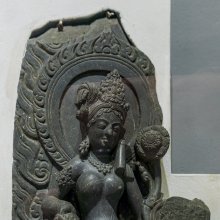Padmahasta, Padma-hasta: 7 definitions
Introduction:
Padmahasta means something in Hinduism, Sanskrit, Marathi. If you want to know the exact meaning, history, etymology or English translation of this term then check out the descriptions on this page. Add your comment or reference to a book if you want to contribute to this summary article.
Images (photo gallery)
In Hinduism
Vaishnavism (Vaishava dharma)
Source: humindian: 108 names of Lord KrishnaOne of the 108 names of Krishna; Meaning: "One Who Has Hands Like Lotus"

Vaishnava (वैष्णव, vaiṣṇava) or vaishnavism (vaiṣṇavism) represents a tradition of Hinduism worshipping Vishnu as the supreme Lord. Similar to the Shaktism and Shaivism traditions, Vaishnavism also developed as an individual movement, famous for its exposition of the dashavatara (‘ten avatars of Vishnu’).
Shaivism (Shaiva philosophy)
Source: SOAS University of London: Protective Rites in the Netra TantraPadmahasta (पद्महस्त) refers to “one holding a lotus” and is used to describe Buddha, according to the Netratantra of Kṣemarāja: a Śaiva text from the 9th century in which Śiva (Bhairava) teaches Pārvatī topics such as metaphysics, cosmology, and soteriology.—Accordingly, [verse 13.29-36, while describing the appearance and worship of Rudra]—“The Buddha, the great Yogi, sits on a lotus, [head] bent, listening, and wearing mendicant’s rags. [He possesses] beautiful lotus eyes, has a lotus-shaped mark, and is fixed with a jewel. [He is] established in the world, positioned in Samādhi, his hands [making the] wish-granting and protection [mudrās]. Deva holds a rudrākṣa and a lotus (padmahasta). Thus, [the Mantrin] should worship and meditate upon Buddha, [who] grants the fruits of mokṣa to women”.

Shaiva (शैव, śaiva) or Shaivism (śaivism) represents a tradition of Hinduism worshiping Shiva as the supreme being. Closely related to Shaktism, Shaiva literature includes a range of scriptures, including Tantras, while the root of this tradition may be traced back to the ancient Vedas.
Languages of India and abroad
Marathi-English dictionary
Source: DDSA: The Molesworth Marathi and English Dictionarypadmahasta (पद्महस्त).—a (S) pop. padmahastī a Fortunate, successful, prosperous; one blessed in every attempt and blessing all connected with him.
Source: DDSA: The Aryabhusan school dictionary, Marathi-Englishpadmahasta (पद्महस्त).—a pop. padmahastī a Fortunate, suc- cessful, prosperous.
Marathi is an Indo-European language having over 70 million native speakers people in (predominantly) Maharashtra India. Marathi, like many other Indo-Aryan languages, evolved from early forms of Prakrit, which itself is a subset of Sanskrit, one of the most ancient languages of the world.
Sanskrit dictionary
Source: DDSA: The practical Sanskrit-English dictionaryPadmahasta (पद्महस्त).—a. holding a lotus. (-raḥ, -staḥ) 1 an epithet of Viṣṇu.
2) a lotus like hand.
3) Name of the sun.
-rā, -stā Name of Lakṣmī.
Padmahasta is a Sanskrit compound consisting of the terms padma and hasta (हस्त). See also (synonyms): padmakara.
--- OR ---
Padmahasta (पद्महस्त).—a particular measure of length.
Derivable forms: padmahastaḥ (पद्महस्तः).
Padmahasta is a Sanskrit compound consisting of the terms padma and hasta (हस्त).
Source: Cologne Digital Sanskrit Dictionaries: Edgerton Buddhist Hybrid Sanskrit DictionaryPadmahasta (पद्महस्त).—name of a Bodhisattva: Śatasāhasrikā-prajñāpāramitā 42.14.
Source: Cologne Digital Sanskrit Dictionaries: Monier-Williams Sanskrit-English DictionaryPadmahasta (पद्महस्त):—[=padma-hasta] [from padma] m. a [particular] measure of length, [Agni-purāṇa]
Sanskrit, also spelled संस्कृतम् (saṃskṛtam), is an ancient language of India commonly seen as the grandmother of the Indo-European language family (even English!). Closely allied with Prakrit and Pali, Sanskrit is more exhaustive in both grammar and terms and has the most extensive collection of literature in the world, greatly surpassing its sister-languages Greek and Latin.
See also (Relevant definitions)
Partial matches: Hasta, Padma.
Starts with: Padmahastaka.
Ends with: Alapadmahasta, Kolapadmahasta.
Full-text: Dagdhahasta, Padmakara, Kubera, Yakshapati.
Relevant text
Search found 5 books and stories containing Padmahasta, Padma-hasta; (plurals include: Padmahastas, hastas). You can also click to the full overview containing English textual excerpts. Below are direct links for the most relevant articles:
Chaitanya Bhagavata (by Bhumipati Dāsa)
Verse 1.10.31 < [Chapter 10 - Marriage with Śrī Lakṣmīpriyā]
Vedic influence on the Sun-worship in the Puranas (by Goswami Mitali)
Part 9 - Iconographic Traces of Sūrya in the Purāṇas < [Chapter 4 - Vedic Influence on the Sun-Worship in the Purāṇas]
The Skanda Purana (by G. V. Tagare)
Chapter 107 - Procedure of the Worship of Brahmā < [Section 1 - Prabhāsa-kṣetra-māhātmya]
The Padma Purana (by N.A. Deshpande)
Chapter 78 - The pacification of the Sun (Bradhna, Sūra, Ravi, Āditya, etc.) < [Section 1 - Sṛṣṭi-khaṇḍa (section on creation)]
Chapter 21 - The greatness of Puṣkara and some important vows < [Section 1 - Sṛṣṭi-khaṇḍa (section on creation)]
Chapter 34 - The gift of Brahmāṇḍa < [Section 1 - Sṛṣṭi-khaṇḍa (section on creation)]

